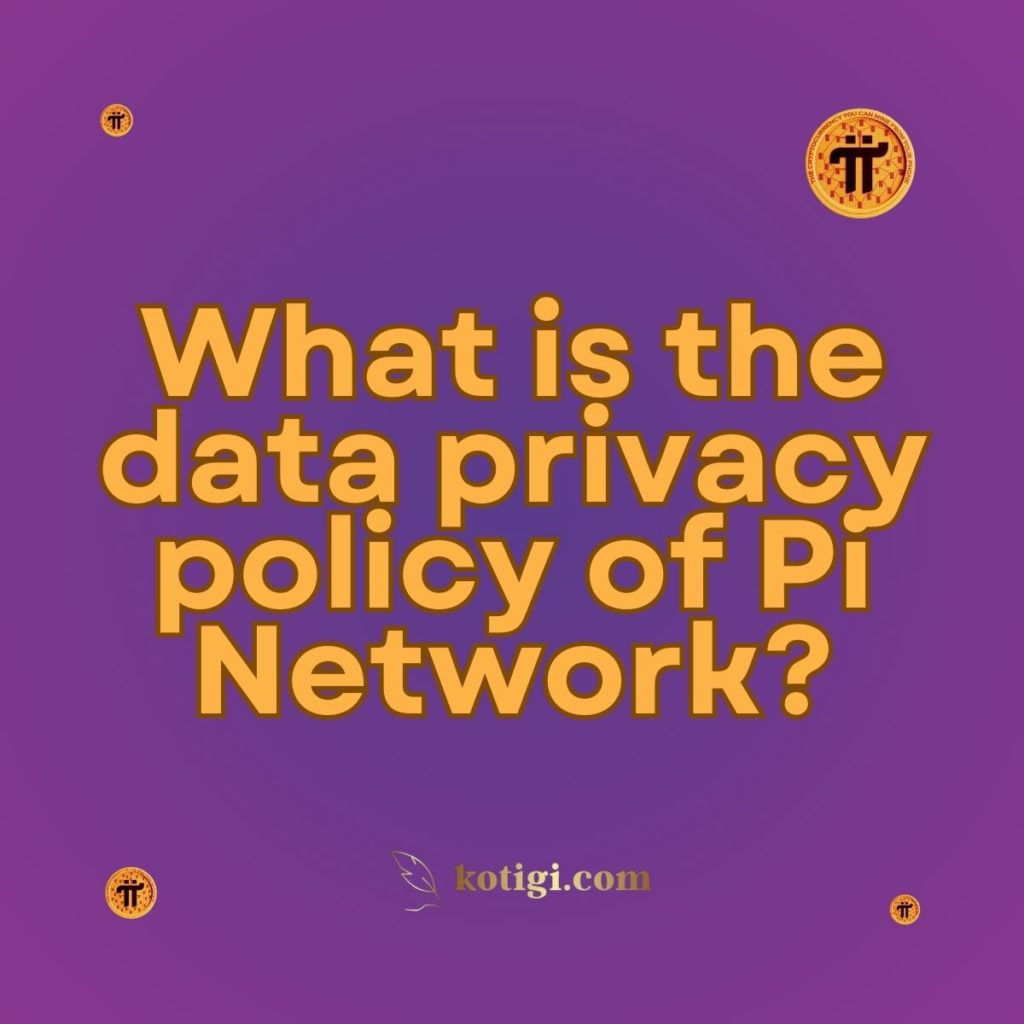
What is the data privacy policy of Pi Network?
Pi Network’s data privacy policy ensures user data is protected by employing encryption, secure storage, and decentralized processes. The platform emphasizes user consent, transparency in data collection, and compliance with regulations like GDPR to protect personal information. It provides users control over their data while maintaining a balance between privacy and the blockchain’s transparency.
Introduction
Data privacy is a fundamental concern in the digital age, especially in decentralized ecosystems like Pi Network. As the world becomes increasingly connected, and more users join the Pi Network to mine and use Pi coins, the platform must ensure that its users’ personal information is secure. This blog explores the key components of Pi Network’s data privacy policy, detailing how the network protects its users and handles personal information, ensuring transparency and trust.
Comparison table that contrasts Pi Network’s data privacy policy with those of other popular blockchain platforms
Here is a comparison table that contrasts Pi Network’s data privacy policy with those of other popular blockchain platforms:
| Aspect | Pi Network | Bitcoin | Ethereum | Monero (XMR) | Ripple (XRP) |
|---|---|---|---|---|---|
| Data Collection | Collects personal data for KYC and verification purposes. | No personal data collection; purely pseudonymous. | No personal data collection; pseudonymous transactions. | No personal data collection, focuses on anonymity. | Collects some personal data for compliance (via exchanges). |
| User Consent | Requires explicit user consent for data collection. | No data collection, so no consent is required. | No explicit consent required for blockchain activities. | No personal data collection, consent not applicable. | Consent needed when interacting with regulated services (exchanges). |
| KYC Process | Decentralized KYC to protect user privacy. | No KYC implemented at the blockchain level. | KYC only through exchanges and external services. | No KYC; focused on anonymous transactions. | KYC required through Ripple partners and exchanges. |
| Data Encryption | End-to-end encryption for data transmission and storage. | Basic cryptographic security for transactions. | Transactions are secure but publicly visible. | Advanced encryption to ensure transaction privacy. | Limited encryption, with focus on transaction speed. |
| Data Retention | Retains data only as long as needed, offers deletion on request. | No data retained (pseudonymous). | No personal data retained. | No personal data, transaction history remains private. | Retains transaction history but limits personal data retention (via exchanges). |
| Compliance with Regulations | Complies with GDPR and global privacy regulations. | No direct compliance with regulations. | No compliance at the blockchain level (depends on apps/services). | No direct compliance, focuses on privacy. | Complies with global regulations through partners. |
| Data Sharing | Limited data sharing, only with third parties for essential services. | No data sharing, transactions are public. | Transaction data shared publicly, no personal data. | No data sharing, Monero transactions are private. | Limited data sharing with Ripple’s network participants. |
| Privacy Features | Strong privacy controls with decentralized processes. | No enhanced privacy features (pseudonymity only). | Public transactions; privacy options depend on layer-2 solutions. | Strong privacy through stealth addresses and ring signatures. | Limited privacy; focused on financial institution transparency. |
| User Rights | Users can access, correct, and delete their data. | No personal data to access or delete. | No personal data on-chain, user rights depend on apps. | No personal data, so access or deletion not applicable. | Users can request data control from partners (exchanges). |
| Security Audits | Regular security audits to ensure data safety. | No audits at the blockchain level (depends on miners). | No regular audits at the protocol level. | Privacy is inherent, but security is audited by the community. | Regular audits through financial partners and institutions. |
| User Education on Privacy | Educates users on privacy best practices and protections. | No formal education (community-driven). | Some educational resources depending on apps or wallets. | Education focused on maintaining anonymity. | Education provided by partners and Ripple Labs. |
Analysis:
- Pi Network focuses heavily on privacy through encryption, data retention policies, and decentralized KYC, offering privacy controls similar to Ripple but much stronger than Bitcoin and Ethereum, which rely on pseudonymity.
- Monero leads in privacy with its advanced anonymity features, offering a higher level of privacy compared to Pi Network.
- Ripple and Pi Network both align more closely with regulatory compliance and user data controls, whereas Bitcoin and Ethereum prioritize transparency at the expense of privacy.
This comparison highlights how Pi Network provides a balanced approach between privacy and regulatory compliance, standing out among more traditional blockchain networks.
1. Overview of Pi Network’s Data Privacy Policy
1.1 Transparency in Data Collection
Pi Network’s privacy policy is designed to provide transparency in how data is collected, used, and stored. The platform informs users about what data it collects during the sign-up process and while using its services.
1.2 Commitment to User Privacy
Pi Network is committed to safeguarding the privacy of its users by ensuring that data collection is minimal and aligned with industry standards, such as the General Data Protection Regulation (GDPR).
2. Personal Data Collection and Use
2.1 What Data Does Pi Network Collect?
Pi Network collects basic personal data such as names, email addresses, and phone numbers for registration and verification purposes. This data is essential to provide its services and secure users’ accounts.
2.2 Purpose of Data Collection
The primary purposes for data collection include enabling the mining of Pi coins, conducting identity verification (KYC), and enhancing the security of the platform. Pi Network also uses data to improve its services.
2.3 User Consent for Data Collection
User consent is central to Pi Network’s data collection approach. The platform ensures that users provide explicit consent before any personal data is collected, particularly for sensitive information like identity verification.
3. Encryption and Security Measures
3.1 Encryption Technologies
Pi Network employs advanced encryption technologies to secure user data. End-to-end encryption ensures that data transmitted between users and the platform is protected from unauthorized access.
3.2 Securing Stored Data
In addition to encrypting data in transit, Pi Network uses encryption to protect stored data, ensuring that even if storage systems are compromised, the data remains secure and inaccessible to third parties.
4. Decentralized KYC Process
4.1 Privacy in Identity Verification
The Know Your Customer (KYC) process is essential to Pi Network, ensuring users are verified without compromising their privacy. Personal data submitted during KYC is only used for verification purposes and is not shared with third parties.
4.2 Decentralization for Added Security
Decentralizing the KYC process ensures that personal information is not held by a single entity, reducing the risk of large-scale data breaches. This design helps Pi Network maintain privacy while complying with legal and regulatory requirements.
5. Data Retention and Deletion Policies
5.1 Retaining User Data
Pi Network retains user data for as long as it is necessary to fulfill the services users have consented to. The platform does not retain personal data indefinitely and adheres to a “data minimization” principle.
5.2 Requesting Data Deletion
Pi Network allows users to request the deletion of their personal data. Once a user opts out or no longer uses the platform, Pi Network will erase their information upon request, in compliance with legal obligations.
5.3 Data Backup and Recovery
Pi Network ensures that data is regularly backed up and can be recovered in case of system failure. However, backups are securely encrypted and protected from unauthorized access to maintain user privacy.
6. User Rights and Control Over Data
6.1 Right to Access Data
Pi Network gives users the right to access their personal information stored on the platform. Users can request a summary of their data, including what has been collected, how it is used, and who it is shared with.
6.2 Right to Correct Inaccuracies
If a user notices any inaccuracies in their personal information, Pi Network allows them to correct or update the data. This ensures that users always have control over the accuracy of their personal information.
6.3 Right to Opt-Out of Data Collection
Users have the option to opt out of certain types of data collection. While some data is necessary to use Pi Network, the platform ensures that users can limit non-essential data collection activities.
7. Compliance with Data Protection Regulations
7.1 GDPR Compliance
Pi Network complies with GDPR, one of the most stringent data protection regulations in the world. This regulation ensures that users in the European Union have full control over their data, including rights to access, delete, and modify their personal information.
7.2 Other Data Protection Laws
Beyond GDPR, Pi Network adheres to other relevant data protection laws, including California’s Consumer Privacy Act (CCPA), to ensure that global users have the same level of privacy and security.
8. Third-Party Data Sharing
8.1 Limited Data Sharing with Third Parties
Pi Network minimizes data sharing with third parties and only shares information when legally required or for essential services like payment processing. No user data is sold to advertisers or used for marketing purposes.
8.2 Protecting User Data from Unauthorized Access
Pi Network ensures that third-party service providers, such as those handling payment or KYC, follow the same strict data protection policies. Contracts with third parties ensure that personal data is not misused.
9. Security Audits and Vulnerability Assessments
9.1 Regular Security Audits
Pi Network regularly conducts security audits to ensure that its data protection measures are up to date. These audits identify vulnerabilities and allow the platform to implement the latest security technologies.
9.2 Addressing Potential Threats
Pi Network’s vulnerability assessments focus on identifying and mitigating potential threats to user privacy. By continuously updating its security infrastructure, Pi Network aims to stay ahead of any new cyber threats.
10. Educating Users on Privacy Practices
10.1 Privacy Best Practices for Users
Pi Network provides educational resources that help users protect their privacy. These resources include tips on secure password management, enabling multi-factor authentication, and recognizing phishing attempts.
10.2 Avoiding Common Privacy Pitfalls
Pi Network actively warns its users against common privacy pitfalls, such as sharing their private keys or personal information with unauthorized parties. By staying informed, users can take responsibility for their own privacy.
Conclusion
Pi Network takes the privacy and security of its users seriously. By implementing robust encryption, providing transparency in data collection, decentralizing sensitive processes like KYC, and adhering to strict regulations like GDPR, Pi Network ensures that user data remains protected. The platform’s commitment to empowering users with control over their data, coupled with regular security audits and education on privacy best practices, makes Pi Network a secure and trustworthy digital ecosystem.
Key Takeaways
| Key Takeaway | Details |
|---|---|
| Transparency in Data Collection | Pi Network clearly communicates what user data is collected and how it is used. |
| User Consent and Control | Users must provide explicit consent for data collection and have the right to control and access their data. |
| Data Encryption | Advanced encryption secures both transmitted and stored data, protecting it from unauthorized access. |
| Decentralized KYC Process | Decentralized KYC ensures privacy and reduces the risk of data breaches by not centralizing sensitive information. |
| GDPR and Global Compliance | Pi Network adheres to GDPR and other global data protection regulations to protect user privacy. |
| Limited Data Sharing with Third Parties | Data is only shared with third parties when legally necessary or required for core services, and never sold for marketing. |
| Security Audits and Continuous Updates | Regular audits and vulnerability assessments help Pi Network stay ahead of emerging security threats. |
| User Education | Pi Network educates users on best privacy practices, empowering them to protect their own data. |




